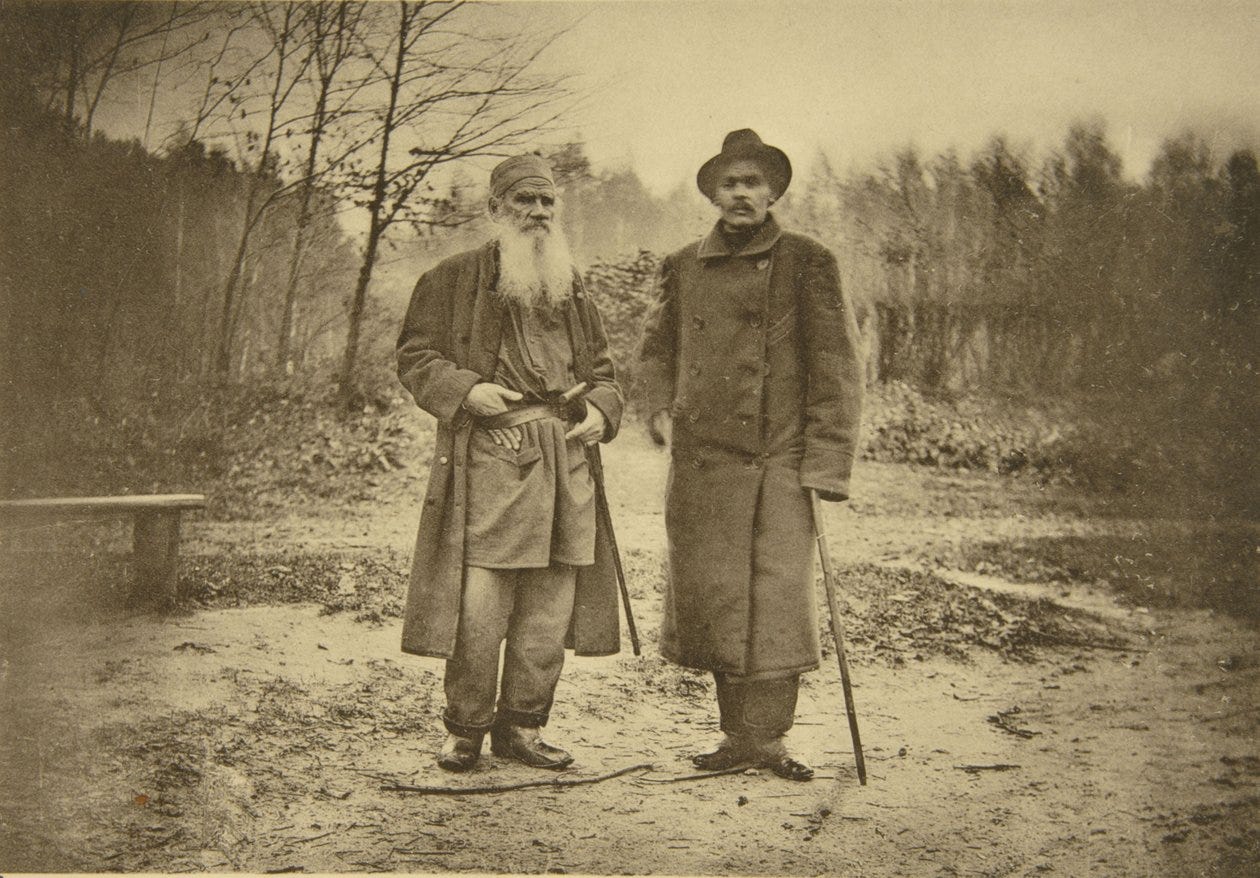Dear Republic,
In honor of, I guess, Victory Day, the defeat of the Fascists, and the heroic defense of the Motherland, we honor Maxim Gorky, winner of the Order of Lenin and founder of Socialist Realism, as part of the ‘underestimated writers’ series. For my money,
is one of the most talented writers in this space with a real gift for blending the personal and cerebral.-ROL
READ MAXIM GORKY
At seventy-two, Tolstoy was the most famous writer in Russia, well into the beatific, heretical Christianity he had discovered during his spiritual crisis two decades earlier.
Maxim Gorky was much younger, the next big thing, risen to fame as a rakish "hobo writer" after the publication of his first book of short stories about life on the steppe.
When fame came, Gorky, more than anyone, realized what it was about. Modest to the point of being self-critical, he was acutely aware that it was more what he represented for Russia's literary elite than his writing: an orphan autodidact, with a distinctive face and a criminal record, who had spent his youth tramping with hoboes, working all manner of jobs, eventually falling in with a populist revolutionary milieu. He had lived the life they only fetishized.
"Here was a writer who actually emerged from "the people" who wrote of them with none of that pious sympathy for suffering traditional among the intelligentsia. A hater of the very Russian peasant whom Turgenev, Tolstoy, and Dostoevsky had sanctified," wrote the Gorky scholar and translator Donald Fanger.
Gorky's political development began with his acquaintance of a circle of populists in Kazan. He did not like their self-righteous dogmatism or the way they tokenized him as a "man of the people."
He was led to Marxism not by reading Marx, but by his job as a baker's assistant, where he met revolutionary workers and peasants. He gave rural collectivism a serious shot, participating in the establishment of a radical store in the village of Krasnidivo. The experiment ended in disaster, with the store being burnt down and Gorky and his comrades driven from the town. The populists were beginning their long eclipse into obscurity, and Marxism was on the rise. Soon after, he allied himself with a rising young clique of writers and critics who were later to become the key members of the Bolshevik faction. For the rest of his life he loathed rural life, the peasants, and the countryside.
In 1900, he fell in with the small entourage of writers around Tolstoy, alongside Chekhov and Leonid Andreyev.
This difficult friendship — which verged on frienemyship — seemed clear from their first impressions of each other, which they communicated to Chekhov.
"A real man of the people," Tolstoy wrote of Gorky. "I am sure he's an atheist. Don't you think so?"
Gorky on Tolstoy: "His interest in me is an ethnographic interest… To him I belong to a tribe he doesn’t know very well — that, and no more.”
Gorky had tried to meet Tolstoy years before — when he was just another vagrant with a working-class face — hoofing it out to Yasnaya Polyana in hopes of convincing Tolstoy to give him a plot of land on which to build some foundation of a life. Tolstoy wasn't around, but Sonya fed him tea and buns and complained about the sketchy people asking her husband for things before sending him on his way.
The two men were at crosscurrents, both spiritually and in their self-conceptions. All people are fallible, and trying to befriend your heroes is always a risky undertaking, ripe for disillusionment.
Gorky wrote that there was much in Tolstoy that evoked “something close to hatred for me, much like an oppressive burden on my soul. His hypertrophied personality is a monstrous thing, a thing almost deformed… He has often struck me as a man who is fundamentally, in the depth of his soul, indifferent to people, being so much higher and more powerful than they that they all seem like midges to him, and their frantic concerns ludicrous and pitiable.”
Tolstoy criticized the portrayal of peasants in Gorky's stories for not being "real peasants." Having a rich, self-deluded aristocrat who liked dressing like a poor person give him this kind of advice nearly drove Gorky mad.
At one point Tolstoy told Gorky, according to Gorky’s Memoirs, “‘I am more of a peasant than you, and can feel things the way peasants do better than you can."
To which Gorky appended the note, "My God! He shouldn’t boast of that! He mustn’t!”
The Memoirs depict Tolstoy incessantly goading and prodding and teasing Gorky. Here is Gorky’s account of it:
He likes to ask difficult and malicious questions:
“What do you think of yourself?”
“Do you love your wife?”
“What do you think, is my son Lev talented?”
“Do you like my wife?”
It is impossible to lie to him. Once he asked, “Do you like me, A.M?”... He’s ‘testing,’ constantly probing, as if getting ready for a fight. It’s interesting, but I can’t say I like it much. He is the devil, and I am still a babe, and he should leave me alone.
Their other major difference, apart from manner, is on questions of religion and spirituality. As with his idiosyncratic politics, on religion Gorky was extremely contrarian — he was not by nature spiritual or religious, but recognized a need for religion, and was fascinated by renegade priests and the revolutionary potential of spirituality put to good use.
Tolstoy had fled the world of culture that was his birthright, while Gorky had crashed a party where he was not welcome, and was made the guest of honor.
Rather than balk at his fame, Gorky, like anyone who needs to escape their class, played his role. He was shrewd about initiating and maintaining friendly relations with important people, from the major writers and critics of the 1890s right up to Stalin.
While today Gorky is considered a collaborator, providing literary cover to the worst parts of Stalinism — the show trials, the mandate of "socialist realism," the imprisonment of writers and editors, and the downplaying of the Ukrainian starvation— the story is a bit more complex. He was never a dyed-in-the-wool Bolshevik or a true-believer, he lived in exile in Italy during their long rise and large portions of the early years, didn't participate in the 1917 Revolution, didn't agree with them on many points, and intervened to save as many dissident writers and editors as he could so they wouldn't get thrown under the bus.
Late in life, after extended wheedling and prodding by Stalin, Gorky finally agreed to return back to Russia to become the grand old man directing the Writers’ Congress and Soviet letters. He was, in effect, Stalin's puppet. There were rumors for years that his death wasn't from tuberculosis, but from Stalin having him poisoned.
Gorky was Russian literature’s Edmund Wilson — if Edmund Wilson had a political past and, in addition to building modernist criticism, wrote some pretty good novels. As a stylist and with genre, Gorky is fairly hard to place. At least in translation, he's a shapeshifter: the triptych of My Childhood / In The World / My Universities are straight memoir, beautifully written. Some of the novels like A Confession and Life of a Useless Man are dream-like, first-person proto-modernism, portraying a grinding and brutal class reality — almost like Dickens, but with an undercurrent of “this is why we need a revolution.” Others like The Artamonov Affair and Life of Klim Samghin are more formal generational epics containing almost a historical-social lesson. The Artamonov Affair, like the TV show Succession, portrays the decay of generational wealth: how a brilliant industrialist family is wrecked by successive waves of failson children and grandchildren. And Klim Samghin shows the progression of political movements over decades: they start with middle-class social reformers, then become social-democrats, then populist-revolutionaries, and finally, disciplined Bolshevik radicals.
Sometime in the early 2000s, after having dropped out of college (having been convinced by radical anarchist "un-schooling" propaganda that I had it in me to be an autodidact), I stumbled onto a tattered old copy of Gorky's most famous novel Mother.
The book's cover — spare, nearly abstract expressionist — actively resisted interest: the summary on the back a book provided no information what it was about. It was a novel, maybe about a mother; but, like a barbed wire fence, everything about it screamed: Do Not Read Me! I am boring and stupid and irrelevant to your life!
I retained a vague memory of some high school teacher along the way who had told me that Gorky was a Soviet puppet and was the founder of “socialist realism,” which they had explained as dull Soviet propaganda wrapped in a thin gruel of plot.
I furrowed my brow and flipped through the pages; the translation was weirdly stunted, and the book genuinely seemed boring and irrelevant. It all had the mothball, grandpa's closet smell of Communism. I put the book down, but the thought of it came back to me time and again over the next ten years, haunting me like a missed opportunity.
At the time of this essay's publication, Maxim Gorky's books are deeply out of print in the English language. There was pretty much one working Gorky scholar and translator in America, Donald Fanger at Harvard, and he passed away in 2024.
This is a damn travesty. Where is NYRB Classics? Where are the academic presses, The Library of America?
When I was in high school in the late ‘90s, at least you could still find Mother at Barnes & Noble. Unread, dismissed, but there. I had to crawl around on hands and knees in several good university libraries before I found old 1920s translations of the other novels, some of them kept at a holding facility offsite. When they arrived, I saw I was the first person to have checked them out in decades. Columbia doesn't have his novels The Artomonov Affair or A Confession — available only as a pdf from HathiTrust. In Russia, he has been depoliticized and neutered. I walked through the incredible art-deco mansion in Moscow where Stalin had him housed. Gorky held the Writers’ Congresses there. The mansion had previously belonged to an industrialist family who had been expropriated. I thought, wow, I wish I lived in this house, it had an incredibly rich and dense feeling. There's still some statues and museums and there’s gentrified Gorky Park, but they’re forgotten, like a distant twinkle in an eye that has been closed forever.
I'm a paranoid man, but he is so deeply out of print it is almost suspicious.
It almost seems like some grizzled old man in some basement Office of Cultural Freedom has stuck around after the Cultural Cold War, making sure of it. This is a strange fate for one of the towering and most famous writers of the early twentieth century, the most photographed writer maybe ever — a fate worse than that which befell Dreiser or Thomas Wolfe. Especially because many of his books are not bad, and some are incredibly relevant today. As is the story of his extraordinary and complicated life.
Aaron Lake Smith is a writer currently living in Stockholm. He's written for Harper's, Commonweal, and American Affairs. You can also read him on Substack at Empty Railroad Gulch.









Okay but if we want to read Gorky where do we start? Is there a particular novel or edition that's good? Did you ever read Mother? Was it good? You sold me on him, but now it just seems like there's no actual book to read :)
I assume it was for comedy, but you know why LOA isn't touching this. NYRB, however, maybe could be tempted. Editor Edwin Frank actually answers the email address for suggesting titles. You should contact him and ask.
https://www.nyrb.com/pages/recommend-book